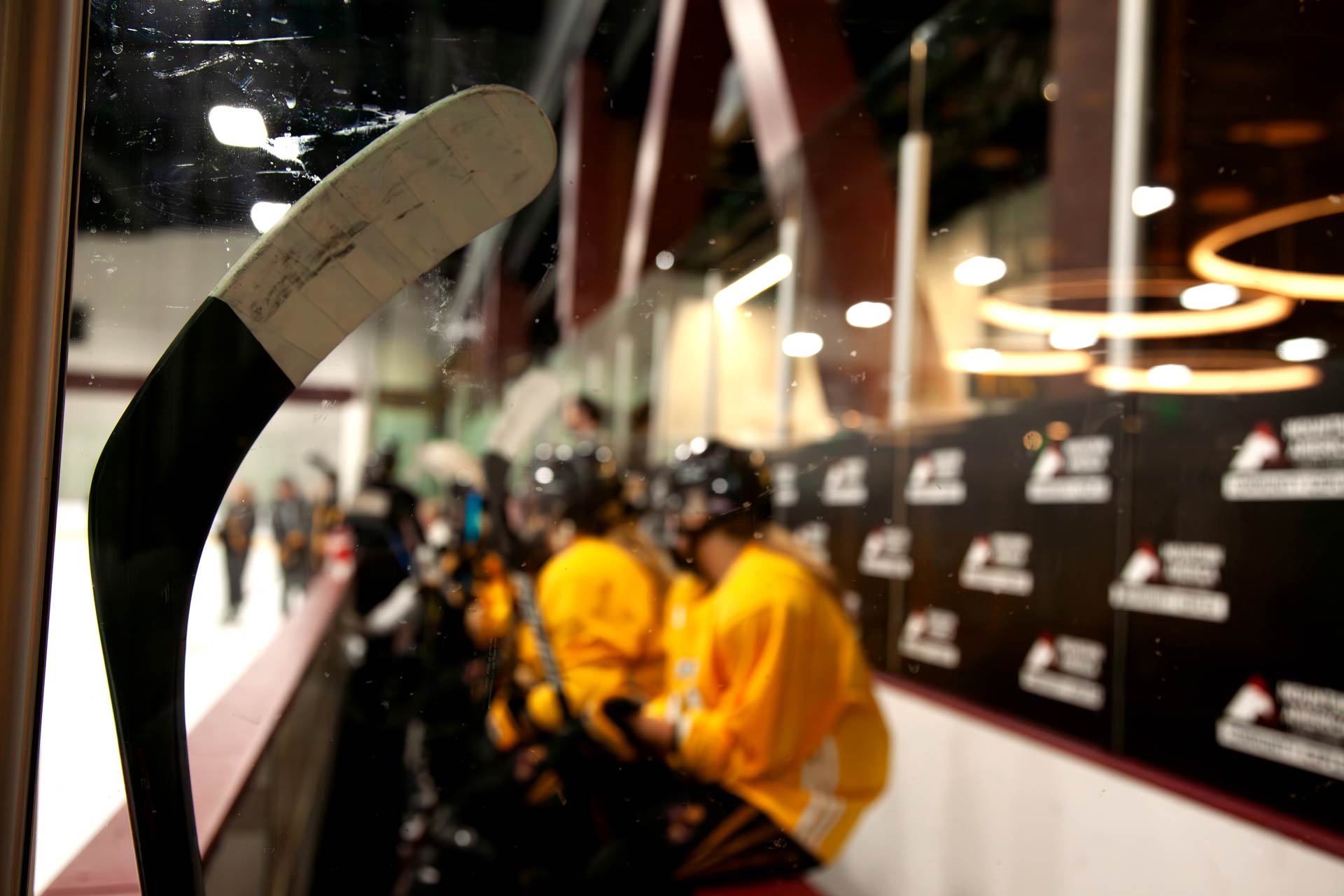 A hockey stick lays against the glass as Arizona State University ice hockey players sit on the bench at the Mountain America Community Iceplex on Wed., Feb. 21, 2024 in Tempe, AZ.
A hockey stick lays against the glass as Arizona State University ice hockey players sit on the bench at the Mountain America Community Iceplex on Wed., Feb. 21, 2024 in Tempe, AZ.
More Than a Game Season 2, Episode 7

As the NHL season closes and reports say top-level hockey appears to be on its way out of Arizona, we head to the sports lower levels. Just because the pros may be leaving doesn't mean the sport is dying. We hear from players and coaches at the state's two collegiate women's hockey teams, the up-and-coming ASU team and the soon-to-start UA team.
Episode Transcript:
[Music]
TP: I'm Tony Perkins, and this is More Than a Game, the podcast that takes you beyond the box score and tells the Arizona sports stories you've never heard.
On this episode, we head behind the scenes of club sports.
[music fades]
While professional hockey in Arizona may seem to be on its way out, two universities are trying to ramp it up. The University of Arizona is finally taking after its archrival Arizona State University by adding a women's ice hockey team. Their inaugural season isn't until this fall, but that doesn't mean they aren't already getting set for it. Paul Rodriguez follows the journey of both teams, from the ice rink to recruitment.
Paola Rodriguez: Picture yourself stepping into the Mountain America Community Iceplex in Tempe. The first thing you notice is the crisp crunch of blades slicing through the ice, a sound that sets the rhythm for the game ahead. It's a symphony of precision and power, each stride a note in the melody of hockey. But the ice isn't the only instrument in play. Listen closely and you'll hear the echoing thud of the puck as it's passed between players. The slap against the boards adding another layer to the composition.
Amidst the action, the voices of the players cut through the cold air through shots and calls adding a human element to the game. While most of us are still asleep, or just beginning our day, Arizona State University's women's ice hockey team is practicing in the early hours of the morning, preparing for their upcoming game in hopes of reclaiming the title of Western Women's Collegiate Hockey League champions.
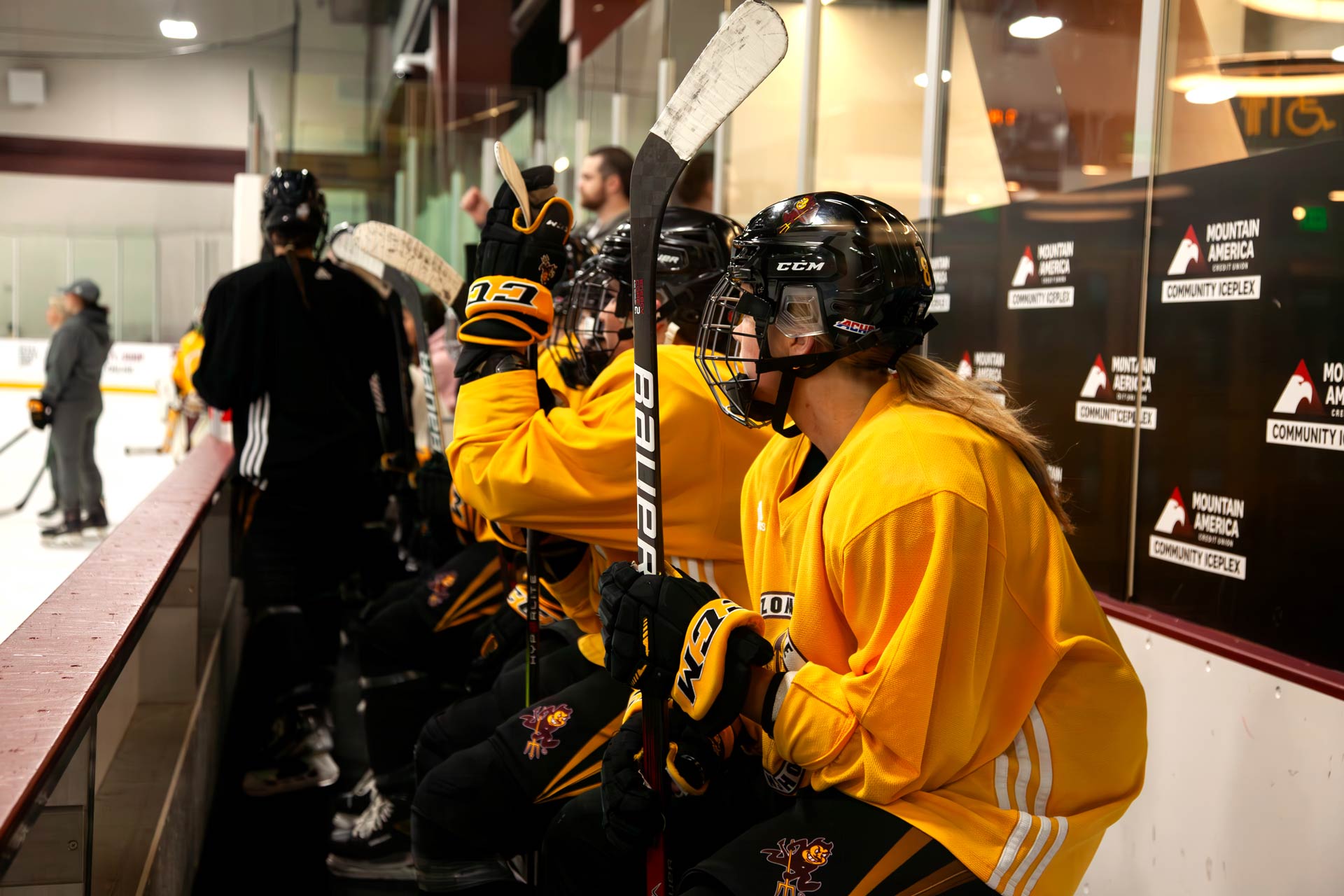 VIEW LARGER Arizona State University's women's ice hockey players sit on the bench as teammates practice drills on the ice at the Mountain America Community Iceplex on Wed., Feb. 21, 2024 in Tempe, AZ.
VIEW LARGER Arizona State University's women's ice hockey players sit on the bench as teammates practice drills on the ice at the Mountain America Community Iceplex on Wed., Feb. 21, 2024 in Tempe, AZ. Lindsay Ellis: Teams want to be the team that's you know, undefeated, but that's something that is an outside pressure that you know, that's how we react to it. So I think going in we've set to play our game and we'll be okay.
PR: Coach Lindsay Ellis first founded the program in 2016. And for the first time in program history, the team went undefeated in their regular season. The stakes are high, but Ellis believes the team can pull through.
LE: It's really neat to see a group of 18 to 22-year-olds come together and you know, accomplish things together and go through, you know, different adversity and just keep building upon it. And this is really the first group that has been resilient through it all. And that shows through, you know, the hockey scores.
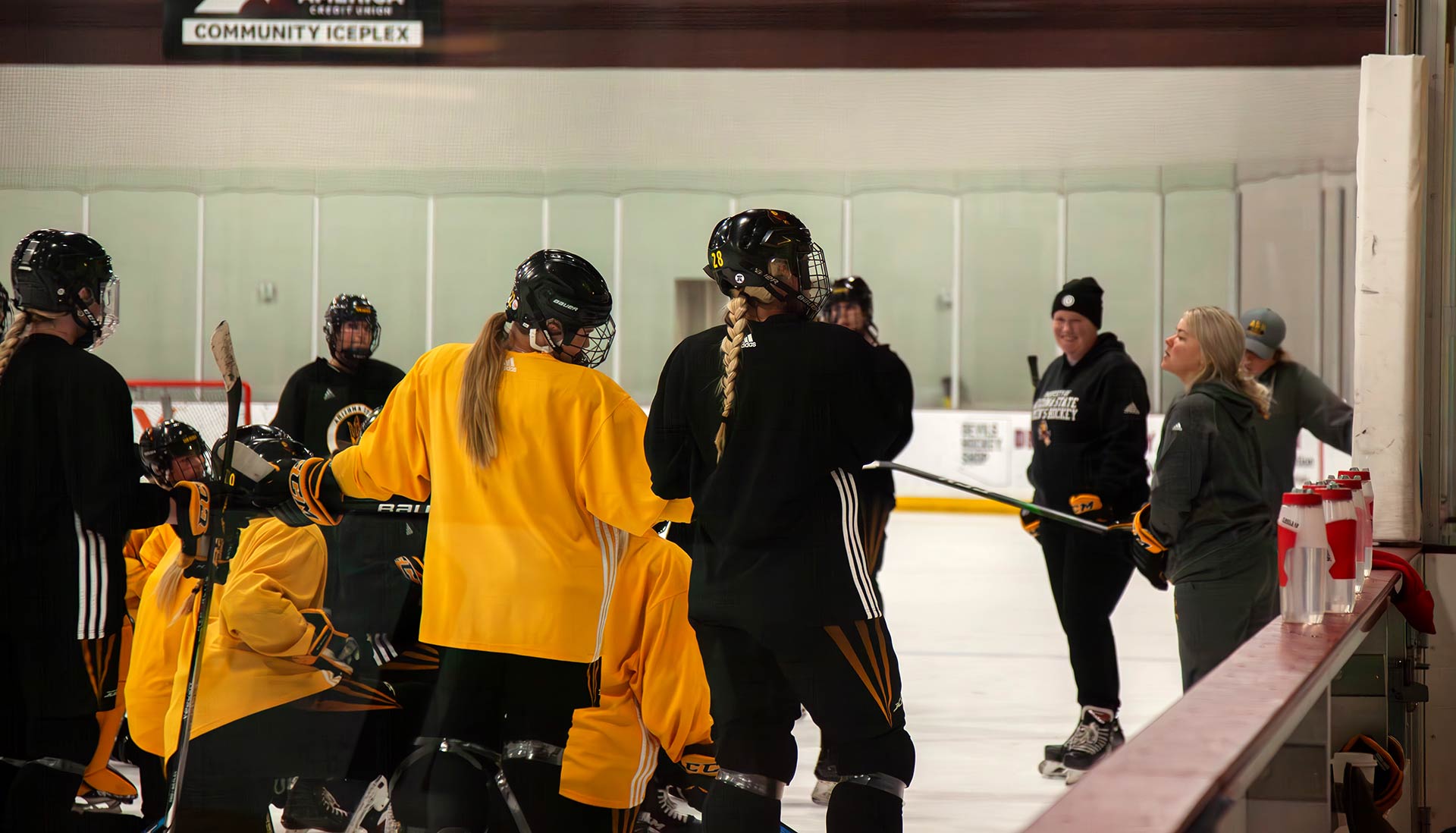 VIEW LARGER Arizona State University's women's ice hockey team gathers on the ice at the Mountain America Community Iceplex to hear feedback from coach Lindsey Ellis on Wed., Feb. 21, 2024 in Tempe, AZ.
VIEW LARGER Arizona State University's women's ice hockey team gathers on the ice at the Mountain America Community Iceplex to hear feedback from coach Lindsey Ellis on Wed., Feb. 21, 2024 in Tempe, AZ. PR: Ellis, an Arizona native, brought the women's team to Phoenix after seeing an unmet need. Now the program has grown in ways she never expected.
LE: When I started the team, I always said it was our same goal, we want to win a national championship. But I really never envisioned that it would be like the way it is now. It's really cool. They have their own little fan base. Sometimes that games I actually caught myself looking at it senior night and it's there's people making posters, there's little girls coming over to, you know, do handshakes before the game. And you know, we've really just grown a community here that didn't exist before.
PR: When Ellis first began her hockey career in the Phoenix Valley, she never had the opportunity to play on an all girls team until she was 16, playing for the lady coyotes of Phoenix area youth travel team.
LE: You know, that was one of the best experiences I've had. And one of the only times I've been coached by females. Went off to college. Same time, the men's ASU team won the national championship, and it really had me thinking, you know, why couldn't we also have that opportunity?
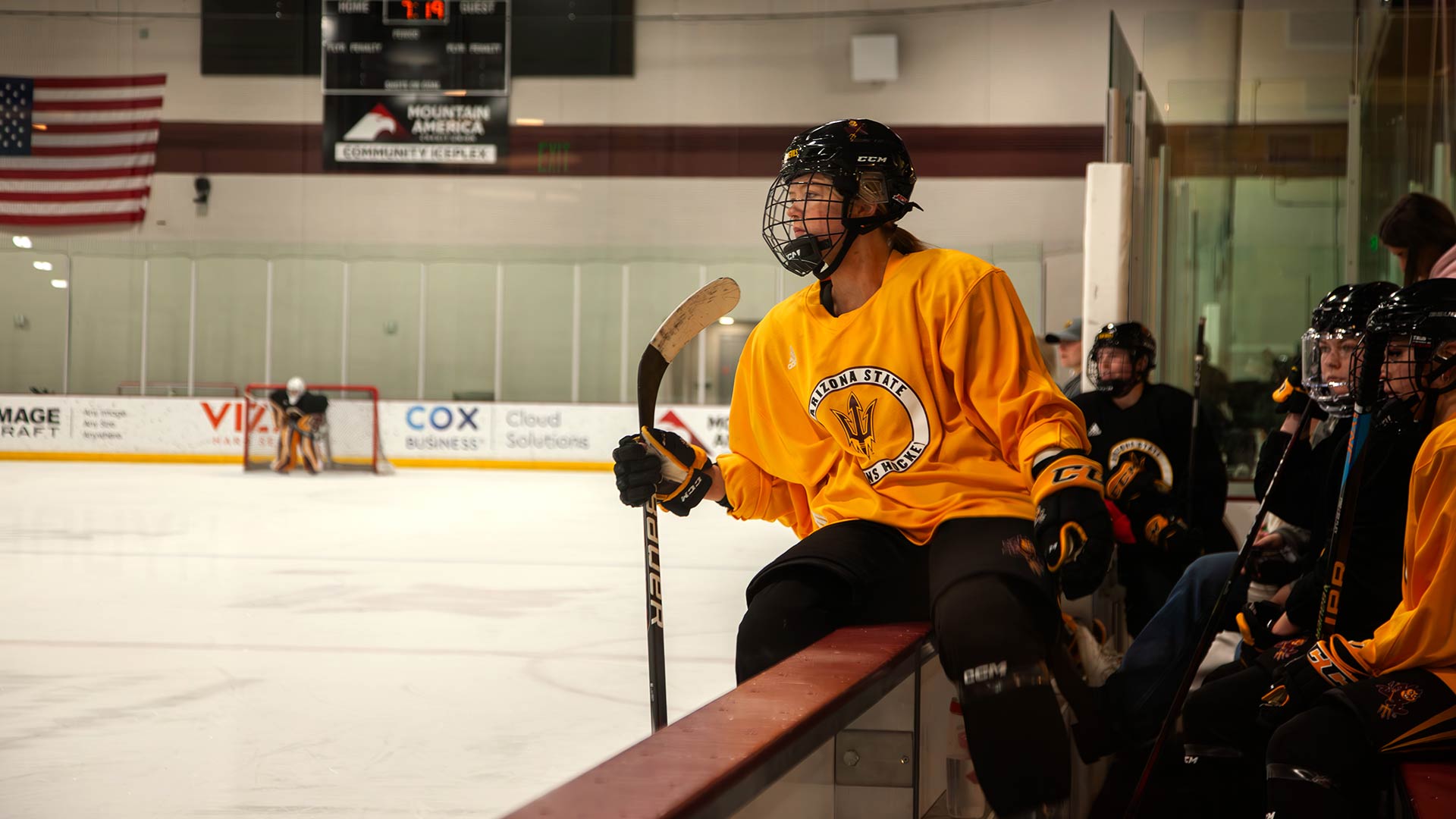 VIEW LARGER An Arizona State University hockey player is about to get on the ice at the Mountain America Community Iceplex on Wed., Feb. 21, 2024 in Tempe, AZ.
VIEW LARGER An Arizona State University hockey player is about to get on the ice at the Mountain America Community Iceplex on Wed., Feb. 21, 2024 in Tempe, AZ. PR: The reality is that most female hockey players rarely have the opportunity to start their career on all girls teams until later on in their careers. Ellie McKenna is one of those many players. She's a junior forward for the Sun Devils. She first found her love for hockey when she started figure skating.
Ellie McKenna: I had realized that pretty quickly. I liked hockey a little bit more than figure skating. So I got into hockey, and I grew up playing boys hockey in Alaska because there wasn't many girls that had played in our state. And when I was 14, I switched over to girls hockey.
PR: While she loved her time on boys hockey teams. She noticed there was a different culture on the women's teams she played on
EM: You just become instant best friends and ever since I switched to girls hockey, every teammate I've ever had has been one of my best friends.
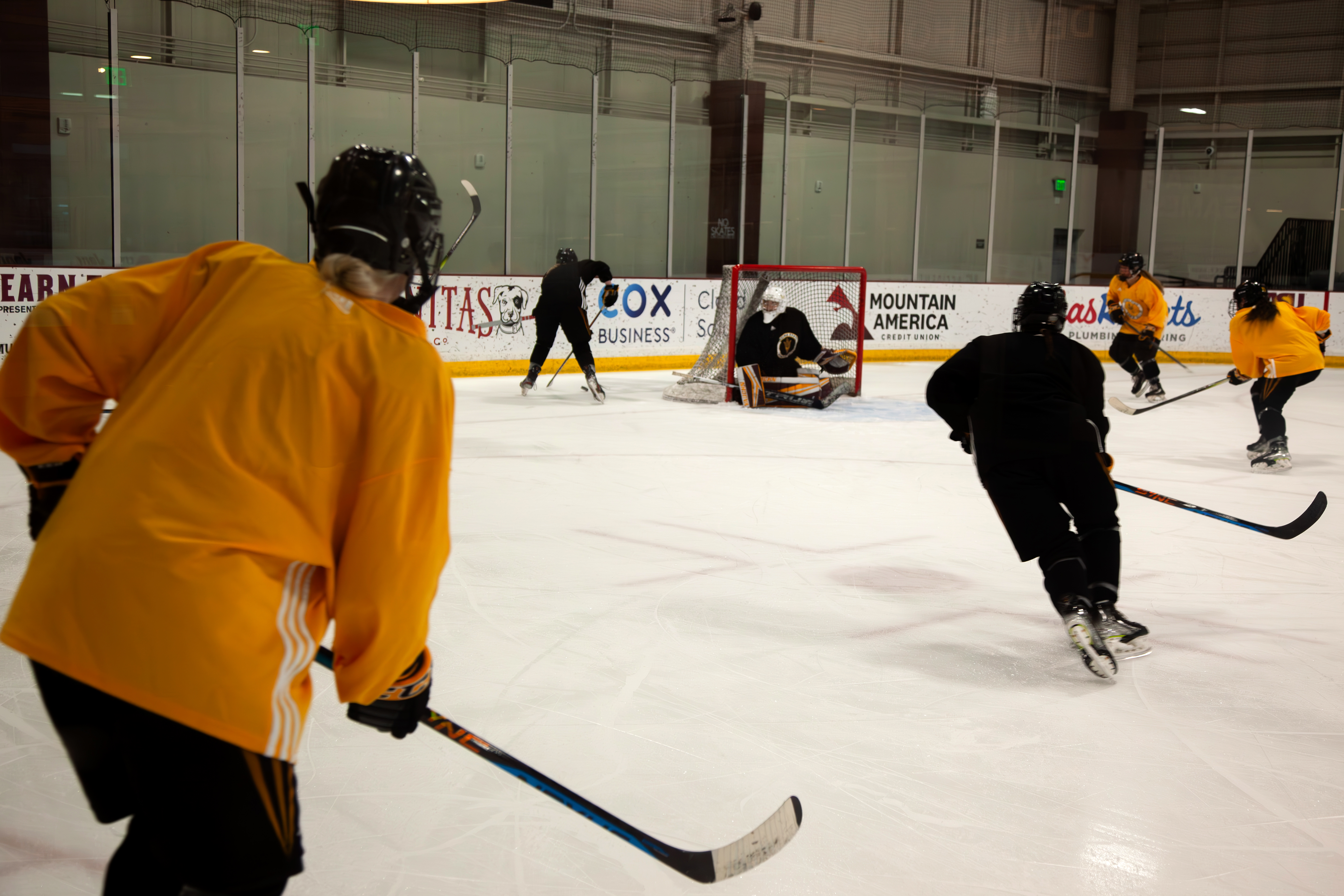 VIEW LARGER Arizona State University's women's ice hockey team practices drills at the Mountain America Community Iceplex on Wed., Feb. 21, 2024 in Tempe, AZ.
VIEW LARGER Arizona State University's women's ice hockey team practices drills at the Mountain America Community Iceplex on Wed., Feb. 21, 2024 in Tempe, AZ. PR: Her words carry weight underscoring what mentorship and representation can mean for young athletes.
EM: There's a lot of women's hockey building in the state of Arizona. And I think it's really important for those girls to have somebody to be able to look up to, especially coming from someone like myself that didn't really have anybody to look up to. And knowing that that kind of role that we have for those girls is crucial with their development and kind of getting to see what their future looks like.
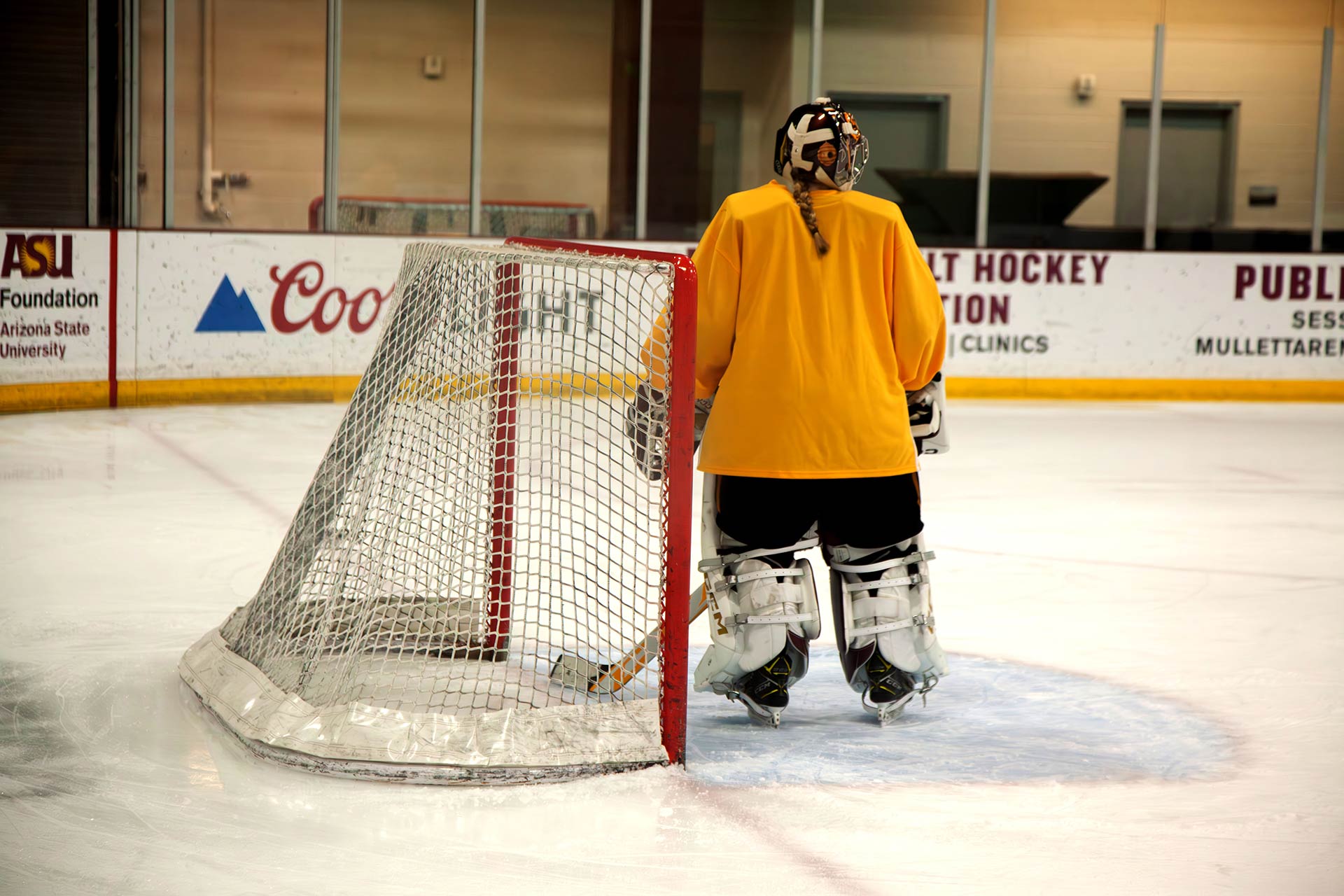 VIEW LARGER An Arizona State University goalie stands in front of the net as teammates practice drills at the Mountain America Community Iceplex on Wed., Feb. 21, 2024 in Tempe, AZ.
VIEW LARGER An Arizona State University goalie stands in front of the net as teammates practice drills at the Mountain America Community Iceplex on Wed., Feb. 21, 2024 in Tempe, AZ. PR: It's experiences like watching women's ice hockey at the Olympics, that can push the next generation of players to follow their dreams. At least that was the case for the University of Arizona's incoming coach, Caitlin Hogan.
Caitlin Hogan: So I watched Team USA get the gold medal hung around their neck. And after that, I was like, This is what I want to do. I want to be up on that podium. I want to be there.
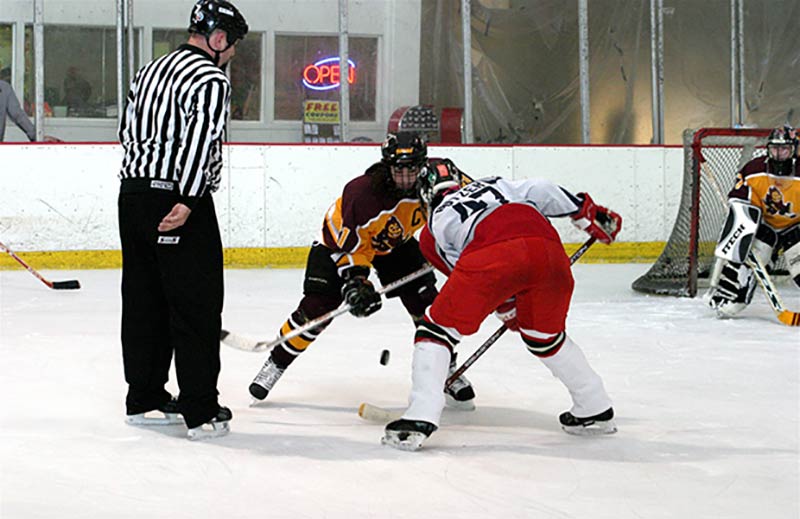 VIEW LARGER The University of Arizona women's ice hockey team plays against Arizona State University during a game in January 2004.
VIEW LARGER The University of Arizona women's ice hockey team plays against Arizona State University during a game in January 2004. PR: Hogan ended up accomplishing that dream, just not for the sport she had in mind. Hogan won two silver medals in weightlifting. After opening a fitness center in Southern California, completing a successful career as a Division One hockey player, and coaching for the Anaheim Lady Ducks, another youth travel team, Hogan decided it was time to go back to her true love.
CH: What's next? And my heart kind of went back to hockey and I was like I miss coaching. I miss like really teaching the next generation how to continue to build the game and build the sport.
PR: That's when she contacted UA about a job and the rest is history. To Hogan, UA's expansion is just a response to a growing demand. But the program's secret is that it is not the first time they had a women's team.
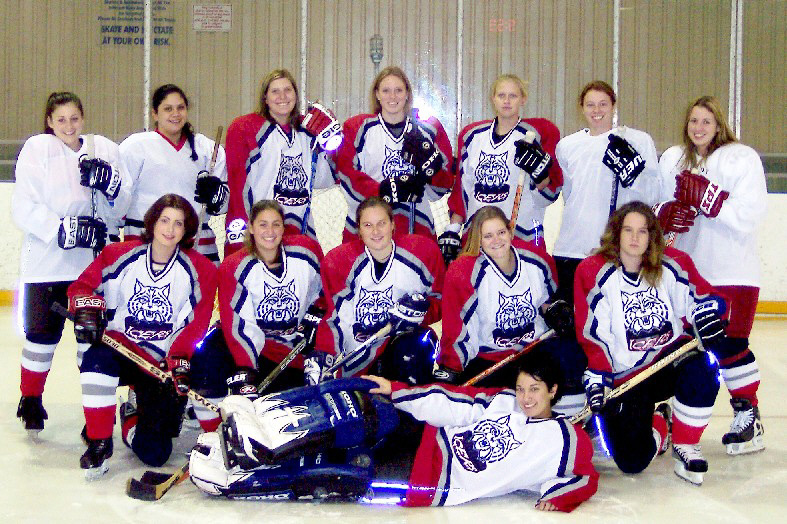 VIEW LARGER The 2004-2005 Arizona Women's Ice Hockey team poses for a photo.
VIEW LARGER The 2004-2005 Arizona Women's Ice Hockey team poses for a photo. CH: And the reason they weren't known is they couldn't take the Wildcat name. So they were the Arizona Icers. So learning that as well that we once had a women's program, and now we haven't in such a long time. It was really cool to see that now we actually have that support from other women who have stuck around.
PR: Seeing the program's revitalization gives hope to Hogan seeing a new level of support from the teams, retired players,
CH: They all had to fundraise they had to pay for their own travel. Some of them didn't even know how to play hockey, but they just loved the idea of being on the ice and being able to be an independent athlete. So they've all been through it. So now we have this list of 20-30 women who are in the same type of experience as the women on my team.
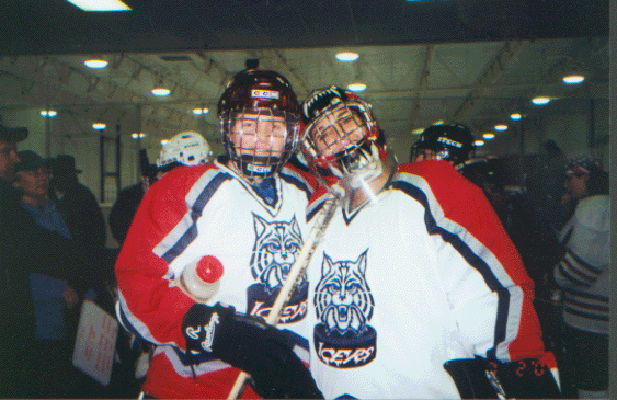 VIEW LARGER The University of Arizona hockey players pose for a photo in Las Vegas in February 2004.
VIEW LARGER The University of Arizona hockey players pose for a photo in Las Vegas in February 2004. PR: As Hogan starts recruiting her first team to come to Tucson, she has found that when it comes to club sports, it's more about advertising the college experience.
CH: It's an honest conversation we have to have with the athletes because I don't think anybody joins a sport to just be mediocre, right? They want to play NCAA, everybody who plays hockey wants to go Division One, but less than 1% of athletes get to go Division One being very real with them and saying, you know, I? I'm guessing you probably are getting offers from NCAA Division Three schools. But there's more to take into consideration than just playing sports. You're you're there for four years. Are you going to enjoy campus life? Are you going to feel a part of campus and be a proud alumni of the school that you went to
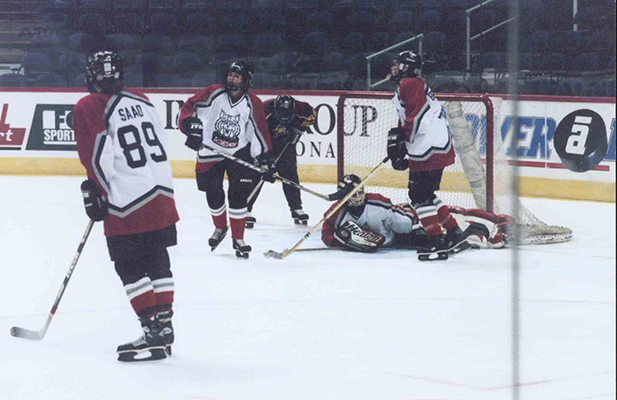 VIEW LARGER The University of Arizona Icers played against Arizona State University at an America West Hockey League tournament during the 2000-2001 season.
VIEW LARGER The University of Arizona Icers played against Arizona State University at an America West Hockey League tournament during the 2000-2001 season. PR: Hogan's pitch and perspective made the world's difference for one player in South Dakota, Rylan Peska, first toured UA when she was visiting her grandmother, and since then you weigh never left her mind.
Rylan Peska: I always had in the back of my head, like, when I would go on a different school visit. I'd be like, Oh, but is it like Arizona? Or Oh, does it give me that feeling? And it's not being an unbiased feeling. But it's like that was the first school I ever toured. And it just like, like has a place in my heart.
PR: Peska has always loved hockey from a young age playing side by side with her sister.
RP: We've played on the same team played on the same line. It's she's two years younger, so of course, but I just felt a more personal connection with hockey and it was something I didn't have to say, Oh, I have to go to hockey. No, I get to go to hockey.
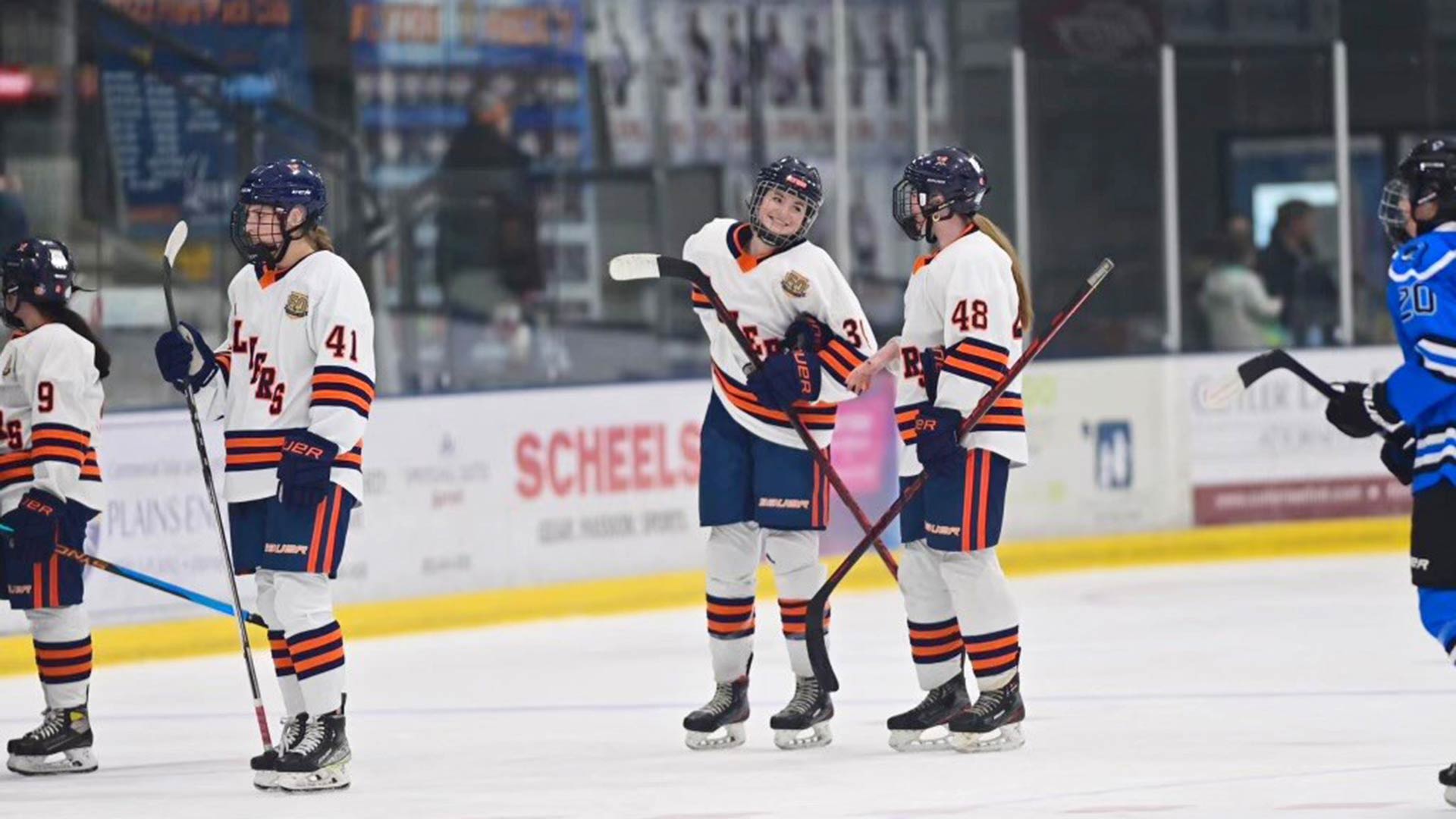 VIEW LARGER Sioux Falls Ice Hockey players and sisters Rylan and Ragyn Peska smile at each other as they skate off the ice in Sioux Falls, S.D.
VIEW LARGER Sioux Falls Ice Hockey players and sisters Rylan and Ragyn Peska smile at each other as they skate off the ice in Sioux Falls, S.D. PR: When it came time to pick a college Peska and her mom could not stop considering U of A.
RP: It's funny. My mom was asking me, 'Rylan, do you know if they're ever going to start a women's team?' And of course the day she asked that I looked it up and it's like oh announcement. So when I found out that news, I was like, just exhilarated and I was so excited to actually potentially have a chance to move down there and play hockey.
PR: The pieces seem to just fall into place for her, and meeting Hogan was the final step. She needed to know this would be her home.
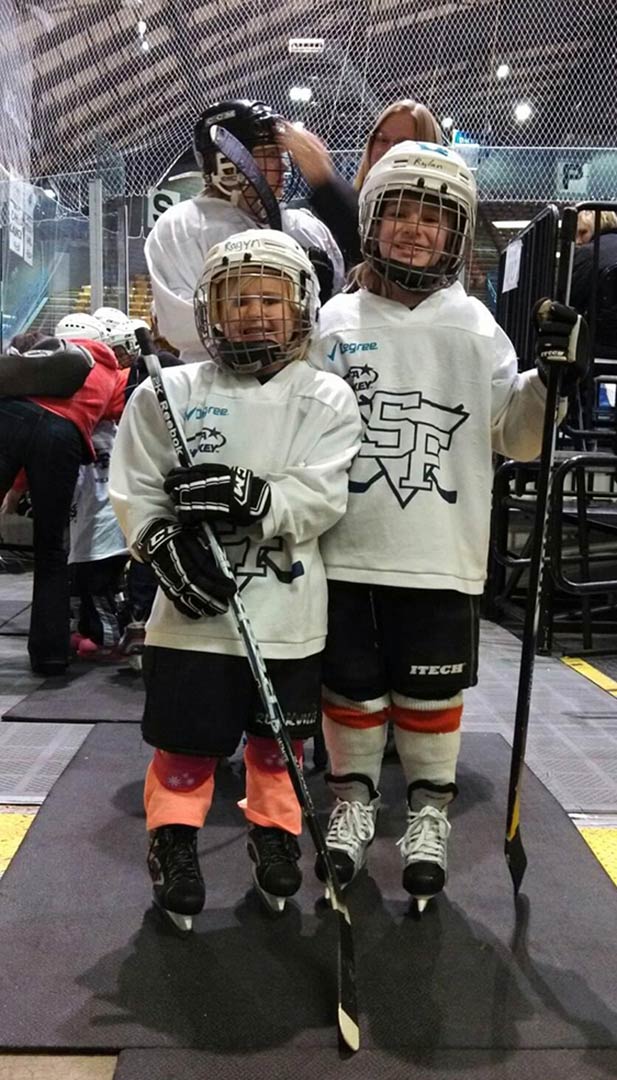 VIEW LARGER Ice Hockey players and sisters Rylan and Ragyn pose for a photo during their youth in hockey gear in Sioux Falls, S.D.
VIEW LARGER Ice Hockey players and sisters Rylan and Ragyn pose for a photo during their youth in hockey gear in Sioux Falls, S.D. RP: She knows how to communicate what with us. She clarified, yeah, you're moving far but I'm going to be your mom here. And it just made me feel very welcomed and safe with her. She said I want to run this like a division one program and even just what her goals were for a first season, I was like I like that determination, and that's what I want to be a part of.
PR: Now that Hogan has started to build a team, community members can expect to attend games as soon as this fall. For this first season, Hogan really hopes to see the same community support that the men's program receives come to the women's side. At the end of the day, this is about more than the game for her.
CH: We just want to continue to grow the sport and show all of those young girls in the stands, what is what they're capable of, to kind of like show them you know, you don't have to just play soccer or softball, there's another sport that you could actually love the same way that we all love it.
PR: I'm Paola Rodriguez for More Than a Game.
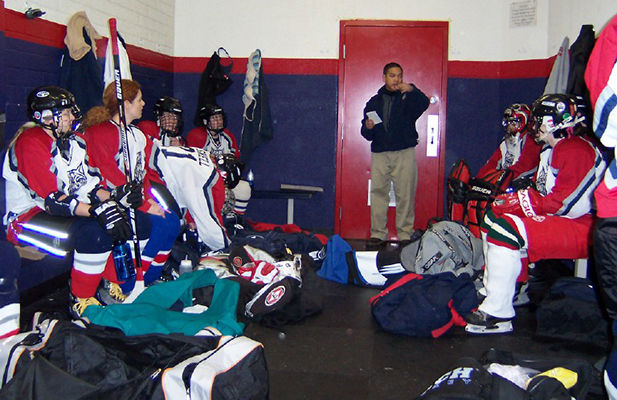 VIEW LARGER The University of Arizona women's ice hockey team gathers in the locker room in January 2004.
VIEW LARGER The University of Arizona women's ice hockey team gathers in the locker room in January 2004. [music]
TP: And that's it for this episode of More Than a Game. Join us next time as we learn about an early pioneer in adaptive sports. The show is produced and mixed by Zac Ziegler. Our news director is Christopher Conover. Our logo was designed by AC Swedbergh. Thanks to our marketing team for their help in launching this podcast. This show is part of the AZPM podcast family. You can find all of our podcasts, news, and video production at azpm.org. I'm Tony Perkins. See you next time.
Nicole Cox: AZPM's podcasts are made possible in part by donations from listeners like you learn more at support.azpm.org Thank you
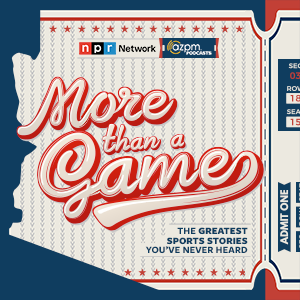

By submitting your comments, you hereby give AZPM the right to post your comments and potentially use them in any other form of media operated by this institution.